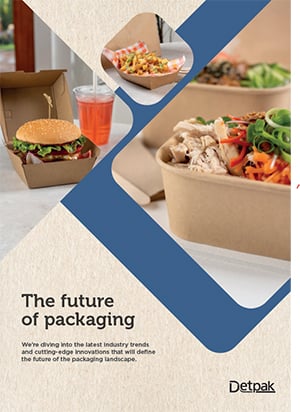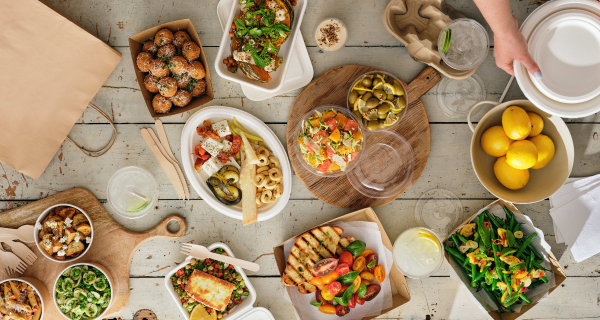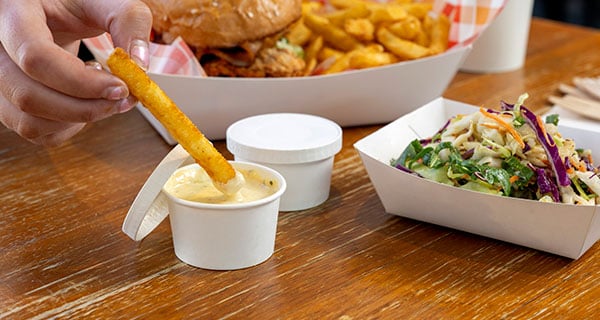With plastic bans continuing to roll out across the country, it’s more important than ever for food businesses to cut plastic waste throughout their operations.
As a food business, it’s essential to choose quality sustainable packaging that’s compliant with plastic bans, within your region.
Before we get into some of the ways you can reduce plastic waste throughout your business, let’s take a quick look at where the legislation originated, and the types of plastics being banned across the country.
Single-use plastic bans
From disposable bags and plastic straws to cutlery and coffee cups, single-use plastics have proved to be incredibly problematic for the environment.
With this in mind, the Australian government introduced the National Plastics Plan 2021. Aimed at increasing plastic recycling and sourcing alternatives to problematic plastics and minimising the impact of plastic on the environment. Following on from the national plan, legislation banning single-use plastics came into effect from July 2022.
Since then, state and territory legislation has been progressively rolled out to reduce plastic waste and environmental impact. Each state and territory have its own timeline and specific regulations for the phase-out of these items. However, these bans typically target items like cups, straws, cutlery, plates & bowls, stirrers, polystyrene food containers, and plastic bags.
Ultimately, these bans are a part of broader environmental initiatives, including promoting reusable alternatives, increasing recycling and composting efforts, and encouraging businesses and consumers to adopt more sustainable practices. The goal is to significantly reduce plastic pollution, particularly in marine environments and landfill, while transitioning towards a circular economy.
10 ways to cut plastic
As a food business owner, beginning to remove plastic from your business can be overwhelming, however, chances are you’ve already began to phase out many plastic items, based on the single-use plastic bans rolled out across your state or territory. However, there’s always room for improvement.
Let’s take a look at 10 simple ways you can reduce plastic waste at your business.
1. Start with an audit
Before you start cutting back on single-use plastics, it’s a good idea to do a quick audit of your current stock to understand how much single-use plastic you use. Once you have a good grasp of the items you have in stock, you’ll be able to quickly identify areas where you can make the switch to more sustainable alternatives.
2. Cut out plastic straws and utensils
Plastic straws are already banned across most of Australia. However, if you’re still offering plastic straws to your customers, switching to a more sustainable alternative, like paper straws, can be an easy place to start when it comes to reducing plastic waste.

3. Opt for refillable condiment bottles
Set up stations where customers can refill their own bottles or containers with beverages, condiments, or bulk items, reducing the need for single-use plastics.
4. Implement a reusable cup system
While many cafes and coffee shops already encourage customers to bring their own reusable coffee cups, you might want to consider introducing a borrow-a-cup program. That way, regular customers can borrow a coffee cup for their daily caffeine hit and return it when they pop back in for their next coffee.
5. Consider compostable cups
Even if you encourage customers to bring their own cups or borrow one of your reusable cups, chances are you’re going to have a few people who will need a disposable cup. This is where compostable coffee cups come in, allowing a better alternative for the environment.
Western Australia has become the first Australian state to ban single-use, non-compostable coffee cups, so it’s only a matter of time until the other states and territories follow suit. With this in mind, it can be worth taking steps now, toward more sustainable coffee cup alternatives.
6. Swap to paper bags
While all Australian states and territories have introduced plastic bag bans, they all have their own individual rules and requirements. With this in mind, it can be worthwhile swapping to recyclable paper bags for your food needs. Whether you’re after carry bags or takeaway bags, there are plenty of sustainable alternatives to single-use plastic bags.
7. Try board cartons and trays
Board packaging is a great alternative to plastic cartons and trays. Not only is board 100% recyclable, it features the Australasian Recycling Label (ARL) for customers to best understand how to dispose their packaging after use.
8. Explore sugarcane packaging
There are many alternatives to single-use plastic packaging. Sugarcane, also known as bagasse, is quickly becoming a popular packaging alternative for environmentally conscious businesses. Crafted from the byproduct of sugar, sugarcane crops are considered a highly renewable resource. Sugarcane is also durable, lightweight and compostable, making it a great option for food businesses. In addition, sugarcane packaging can be custom printed to enhance your business.
9. Switch to reusable alternatives
Depending on your food business, you may be able to encourage your customers to use their own reusable containers, utensils and packaging. With the money saved on packaging costs, you can offer discounts or incentives to customers who bring their own containers or cups.
10. Collaborate with sustainable suppliers
Work with suppliers or directly with manufacturers, like Detpak, to source sustainable alternatives to plastic packaging. You might also want to consider opting for bulk orders to reduce packaging waste and carbon emissions as part of the delivery.
If you’re on the hunt for sustainable packaging alternatives, look no further than Detpak. At Detpak, we’re committed to manufacturing sustainable packaging alternatives while incorporating sustainable practices into our manufacturing process. Our Eco-Products® range is ethically sourced, certified and either compostable or recyclable. Explore the range or contact the Detpak team to see how we can help your food business reduce plastic waste.




















